-
1. Physics
- 0. Physics
- 1. General Introduction
- 2. Current Electricity - Sources and Accessories
- 3. Measurement of Resistance
- 4. Measurement of Electromotive Force and Potential Difference
- 5. Galvanometer, Ammeter and Voltmeter
- 6. Frequency of A.C. (Alternating Current) Mains
- 7. Focal Length of Spherical Mirrors
- 8. Focal Length of Spherical Lenses
- 9. Refractive Index of Prism Material, Glass Slab and Transparent Liquid
- 10. Semiconductor Diodes and Transistors
- 11. Activities
- 12. Experiment
-
2. Chemistry
- 0. Chemistry
- 1. Introduction to Basic Laboratory Equipment
- 2. Surface Chemistry
- 3. Chemical Kinetics
- 4. Thermochemistry
- 5. Electrochemistry
- 6. Chromatography
- 7. Preparation of Inorganic Compounds
- 8. Preparation of Organic Compounds
- 9. Tests for the Functional Groups Present in Organic Compounds
- 10. Tests of Carbohydrates, Fats and Proteins in Pure Samples and Detection of Their Presence in Given Food Stuffs
- 11. Volumetric Analysis
- 12. Chemistry Qualitative Analysis
- 13. Experiment
- 3. Biology
And to support this, the lab manual Class 12 serves as a proper guide. This resource includes well-structured experiments, step-by-step procedures, clear explanations, etc.
On the leading educational website of SelfStudys, you will get the lab manual Class 12 2025-26 for free, which you can download as well. In this, you will learn how to handle apparatus, record observations, analyze results, as well as present your findings in a systematic manner. So, without any delay, utilize our lab manuals and enhance your scientific understanding to the next level.
Overview Of The Lab Manual Class 12 2025-26
Here is a table that highlights all the important points of our CBSE Class 12 lab manual.
|
ASPECT |
DETAILS |
|
Format |
The NCERT lab manual Class 12 is available in PDF format. |
|
Organization of the Class 12 Practical Lab Manual |
Subject-wise lab manuals for Physics, Chemistry, and Biology. |
|
Cost/Access |
Free: You don’t need to pay anything to download the Class 12 lab manual book. |
|
Syllabus Alignment |
The Class 12 practical manual is designed as per the latest CBSE lab practical syllabus. |
|
Contents per Experiment in the Lab Manual Class 12 PDF |
Every experiment has:
|
|
Additional Features |
The lab manual Class 12 PDF free download also has MCQs, viva questions, and detailed diagrams. |
CBSE Class 12 Lab Manual Available For Different Subjects
On our digital platform, we provide a collection of lab manual Class 12 PDFs for all major science subjects. This way, you get access to well-structured and board-aligned practice materials for Physics, Chemistry, and Biology. The subject-matter experts at SelfStudys have designed them in a way so that you can understand every experiment from its basic theory to the final conclusion.
Furthermore, the lab manual Class 12 2025-26 is organized in a chapter-wise manner for each subject. It means you will have separate PDF files for each chapter’s experiment. You can use them easily to review a specific practical, prepare for a viva, understand the observation table or calculations, and so on.
| Sr. no. | Class 12 Subject-Wise Lab Manual |
| 1 | Physics Lab Manual Class 12 |
| 2 | Chemistry Lab Manual Class 12 |
| 3 | Biology Lab Manual Class 12 |
Physics NCERT Lab Manual Class 12
The CBSE Class 12 lab manual for the Physics subject helps you connect mathematical as well as theoretical concepts with real-life experiments. The practicals include precise measurements, graphical analysis, use of specific instruments such as vernier calipers, potentiometers, ammeters, and optical devices. In our lab manuals, you will see that every experiment has simple steps that you can follow easily.
Some of the important experiments that are covered in the Physics NCERT lab manual Class 12 are Ohm’s Law, studying the characteristics of diodes, determining the focal length of lenses, analyzing resistances in series/parallel, and more. When you practice with this manual, you will be able to handle instruments, perform accurate measurements, as well as present your records confidently.
Class 12 Practical Lab Manual For Chemistry
In order to master the essential skills that are required for chemical analysis, titration methods, organic compound identification, salt analysis, and various chemical reactions, the Chemistry Class 12 practical lab manual has been created. The skills that you need for the practicals are accuracy, observation, and proper handling of laboratory chemicals.
In our Class 12 lab manual book for Chemistry, you will find all the major experiments like acid-base titrations, redox titrations, qualitative inorganic analysis, preparation of organic compounds, tests for functional groups, etc. Moreover, in every practical, there are diagrams of lab apparatus, safety precautions, and step-by-step explanations so that you don’t make any common mistakes.
Biology Class 12 Lab Manual Book
The focus of the Class 12 practical manual for Biology is to develop your observational skills, microscopy techniques, biological samples analysis, and so on. The experiments that are involved in this subject are mostly related to plant physiology, animal tissues, genetics, biomolecules, and ecological studies.
At SelfStudys, you can access the Biology lab manual Class 12 PDF with hands-on activities like preparing temporary slides, studying mitosis stages, analyzing specimens, testing biomolecules (glucose, starch, proteins), examining plant water transport mechanisms, etc. Also, you will see that each experiment has diagrams that are drawn along with precautions, just as expected in the board exams.
Procedure To Access The Class 12 Practical Manual On Our Platform
With the help of the steps that are given here, you can reach the page of the lab manual Class 12 PDF free download and use it.
- You should type www.selfstudys.com into the web browser that you like to use on your device.

- Once the website opens, you need to tap on the ‘Navigation’ bar on the left and select the ‘CBSE’ section.
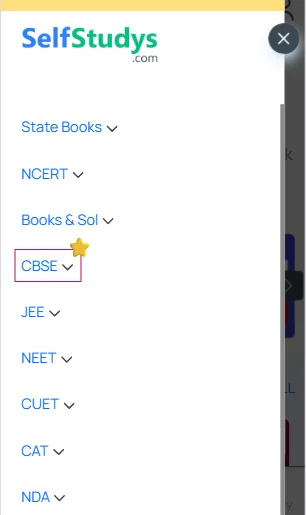
- From various study materials, you have to tap on the ‘Lab Manual’ option to open a new web page.
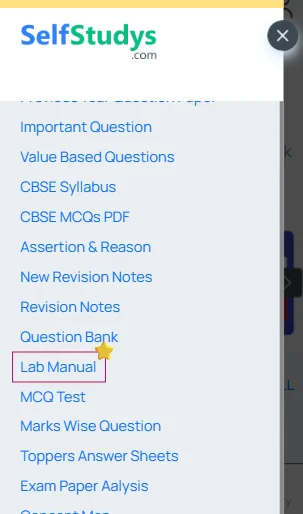
- Here, you have to click on the class icon, and the subject-wise lab manual Class 12 will be available.

- Now, you can choose and select the subject for which you want to get the lab manual Class 12 2025-26.
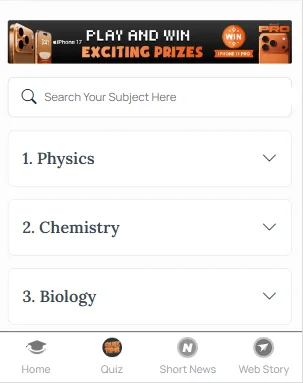
- Then, from the list of chapters, you can click on any one to open its CBSE Class 12 lab manual and study the experiments.
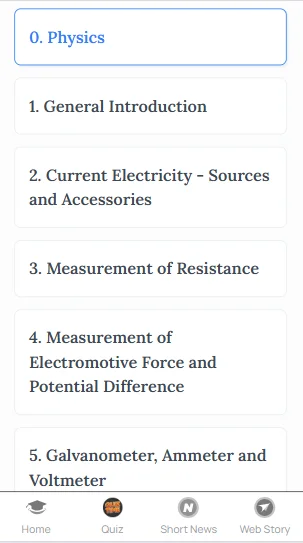
Note: The PDF downloading of the NCERT lab manual Class 12 can be done once you have Logged In or Signed Up on SelfStudys.
What Is Included In SelfStudys’ Lab Manual Class 12 PDF?
The Class 12 practical lab manual is considered to be a complete learning guide with which you can develop scientific skills, understand the concepts in a practical way, as well as prepare for the board practical exams. Every component of the manual that supports you at each stage of the experiment is mentioned in the table below.
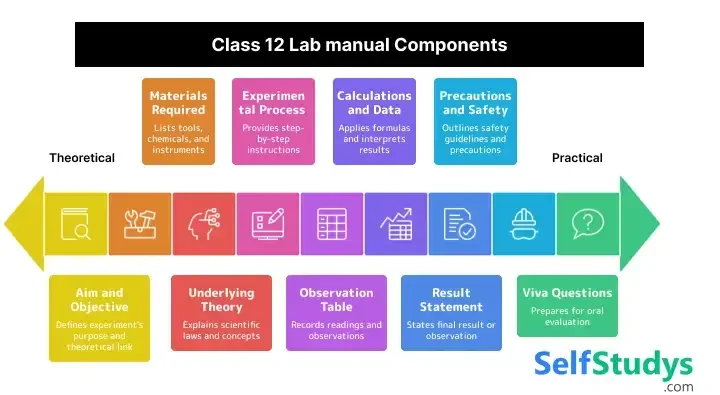
|
COMPONENT |
DESCRIPTION |
|
Aim and Objective of the Experiment |
In the Class 12 lab manual book, what the experiment intends to prove or observe is defined clearly. With the help of this section, you can understand the purpose behind every practical and link it with the theoretical concepts of the chapters. This way, you can make sure to approach the experiment with clarity as well as direction. |
|
Materials Required and List of Apparatus |
The Class 12 practical manual has a proper list of tools, chemicals, instruments, glassware, models, and biological specimens that are needed. You will also notice that every item is mentioned with standard lab notations. It helps you get familiar with the real requirements in the laboratory. |
|
Underlying Theory and Scientific Principle |
The foundation of any experiment is formed by a detailed explanation of the scientific laws, reactions, formulas, or concepts. This section of the lab manual Class 12 PDF connects practical application with topics of the syllabus. This makes it easier for you to justify the observations as well as answer the viva questions. |
|
Step-by-Step Experimental Process |
You will see that the lab manual Class 12 PDF free download includes a proper set of instructions in bullet points. With this guide, you can complete the whole procedure, from setting up the apparatus to noting down the final readings. These steps are created in a way that you can reduce errors and perform the experiment in an effective manner. |
|
Observation Table and Experimental Readings |
The lab manual Class 12 also has ready-to-fill tables where you can record your readings, like voltmeter values, titration burette readings, slide observations under a microscope, color changes in chemical reactions, etc. In this way, you will be able to maintain accuracy as well as present clean, practical files. |
|
Calculations and Data Analysis |
There is a special section in the lab manual Class 12 2025-26 that contains formula applications, sample calculations, graphs (for Physics), stoichiometric calculations (for Chemistry), and reasoning-based analysis (for Biology). With its help, you can interpret the results of the experiment in a scientific way. |
|
Result Statement |
The CBSE Class 12 lab manual includes a conclusion of the experiment. It states the final result, constant values determined, or a biological observation that you made. By studying this statement, you can understand the correct format of writing results. |
|
Precautions and Safety Guidelines |
There are some safety steps mentioned in the NCERT lab manual Class 12 that you must follow. It can be handling acids carefully, using microscopes correctly, measuring electrical components safely, etc. A few precautions specific to the experiment are also given so that you can avoid mistakes. |
|
Viva Questions with Answers |
The Class 12 practical lab manual provides you with viva questions that are related to every practical. Additionally, clear and concise answers are also given in order to prepare you for the oral evaluation. |
|
Diagrams and Illustrations |
In the Class 12 lab manual book, you will get well-labeled diagrams or experimental setups, laboratory instruments, slides, circuits, biological specimens, and so on. All these diagrams follow the standards of the board exam as well as help you draw them accurately in your practical files. |
Common Practicals That Students Find Difficult And How Our Lab Manual Class 12 Simplifies Them
In class 12, there are several practicals that can be challenging as they require precision, clarity, familiarity, etc. In this section, we have described some of the most difficult subject-wise practicals and how you can perform them easily by using our Class 12 practical manual.
Physics Practicals
- Measuring Focal Length of Lenses (Convex and Concave)
A number of students find it difficult to align the optical bench correctly, have trouble identifying sharp images, parallax errors during measurements. With the help of our lab manual Class 12 PDF, you will get step-by-step alignment diagrams, tips for achieving a sharp image quickly, and clear instructions on avoiding parallax error with illustrations.
- Using a Meter Bridge or Potentiometer
In this, students struggle with complex circuit connections, understanding balancing length, interpreting null point conditions, etc. By using the lab manual Class 12 PDF free download, you will be able to learn how circuit diagrams are drawn as required in the exam. You will also see a simple explanation of the balance point theory, as well as common mistakes with solutions.
- Plotting V-I Characteristics (Diode/Zener Diode)
It is seen that students get confused in setting up the circuit, have difficulty in reading small variations in voltage/current, and face challenges in graph drawing as well as scale selection. Our lab manual Class 12 gives you realistic circuit layouts with labels, sample reading tables filled for reference, graph plotting examples with correct scaling, and so on.
Chemistry Practicals
- Titration Experiments (Acid-Base, Redox)
Many students have said that they struggle with the inaccurate drop-by-drop handling of the burette, difficulty detecting the endpoint colour, and calculation mistakes in normality/molarity. By working through the lab manual Class 12 2025-26, you can understand coloured illustrations of endpoint changes, tips for consistent swirling and reading burette values, as well as solved sample calculations to practice.
- Salt Analysis (Inorganic Qualitative Analysis)
In this experiment, students are not able to remember the group-wise order of cation/anion, find precipitate colors, or get confused during the confirmatory test. But with the CBSE Class 12 lab manual, you will get the flowchart-style grouping of ions, high-quality diagrams that show precipitate colors, as well as simplified tables with observations for confirmatory tests.
- Organic Compound Identification
A few students struggle with identifying odour changes, uncertainty in heating tests, remembering functional group reagents, and so on. Our NCERT lab manual Class 12 simplifies this by providing tables that summarize functional groups and reagents, clear visual signs, and sample observation tables with correct entries.
Biology Practicals
- Preparing Temporary Mounts (Onion Peel, Dicot Root, Pollen Grains)
Some challenging tasks include struggling to prepare thin, bubble-free slides, difficulty in adjusting the microscope focus, confusion in finding cell parts, etc. The Class 12 practical lab manual gives you detailed diagrams of sample placement, a step-by-step microscope focusing guide, as well as clear, labelled diagrams that highlight visible structures.
- Studying Mitosis/Meiosis Stage
Our experts have noticed that students find it hard to differentiate between cell stages or struggle to stain the specimen properly. By using the Class 12 lab manual book, you will be able to study the chart that shows mitosis vs. meiosis stages with pictures, staining instructions with colour expectations, real-life microscopic images for comparison, and so on.
- Tests for Biomolecules (Starch, Protein, Glucose, Fat)
It is seen that a few students cannot recognize the subtle changes in color, get confused about reagent quantities, or record observations properly, etc. In the Class 12 practical manual, you will find before/after color diagrams for each test. It also includes standard quantity measures and pre-filled sample observation tables.
Conclusion
The lab manual at SelfStudys for Class 12 is a resource that will guide you through some of the most important experiments in your academic journey. In this, the detailed explanations, diagrams, observation tables, as well as viva questions, turn any complex experiment into a simple, step-by-step process. By downloading the manual from our website in advance, you will feel more prepared and in control. This will further help you to excel in your practical board examinations.







 Profile
Profile Signout
Signout









 Quiz
Quiz
 Get latest Exam Updates
Get latest Exam Updates 










